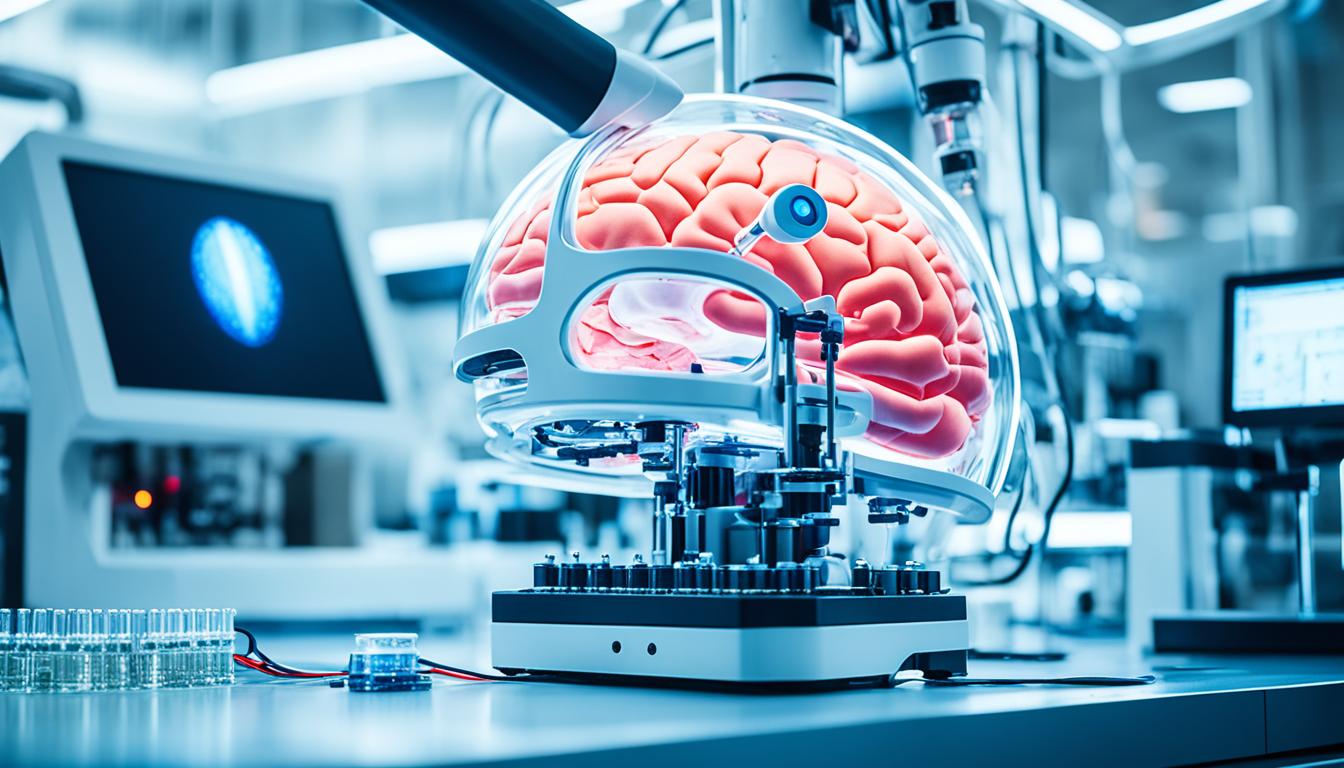Schizoaffective disorder is a serious mental illness. It affects how someone thinks, feels, and acts. People with this disorder might believe things that aren’t true, see or hear things that aren’t there, or act in ways that seem odd to others.
The causes of schizoaffective disorder aren’t completely known. However, experts think both your genes and how you’ve experienced life may have a role. To diagnose it, doctors look at the person’s symptoms and life story closely.
Managing the disorder often involves using medicines and talking with a therapist. Plus, there are support groups and resources to help. Stem cell therapy presents a new and hopeful treatment option. It works by targeting the brain’s issues that come with the disorder.
Key Takeaways:
- Schizoaffective disorder is a severe mental disorder that affects thinking, emotions, and behavior.
- Symptoms include delusions, hallucinations, disorganized speech or behavior, and decreased emotional expression.
- The exact causes of schizoaffective disorder are not fully understood, but genetic and environmental factors are believed to play a role.
- Diagnosis is based on a thorough evaluation of symptoms and history.
- Treatment options include medication management, psychotherapy, and support resources.
- Stem cell therapy shows promise for addressing the neurological dysfunction associated with schizoaffective disorder.
Symptoms of Schizoaffective Disorder
Schizoaffective disorder mixes psychotic and mood symptoms. This can vary, showing differently in each person. Understanding these wide-ranging symptoms is key.
Psychotic Symptoms: This disorder often brings hallucinations and delusions. Hallucinations mean seeing or hearing things that aren’t there. Delusions are false, intense beliefs like paranoia or thinking one is extremely important.
Mood Symptoms: Schizoaffective disorder affects emotions too. Someone may feel very sad and lose interest in life. Changes in eating or sleeping habits, and feelings of worthlessness may occur.
On the other hand, some might feel overly happy and energetic. They could have racing thoughts, act without thinking, or get very angry.
Other symptoms might include:
- Disorganized speech: Talking in a way that’s hard to understand, jumbled, or confusing.
- Social withdrawal: Pulling away from others and not wanting to be around people.
- Decreased motivation: Feeling less driven or interested in things that used to matter.
- Difficulty concentrating: Problems with focusing, staying on task, or completing simple activities.
The intensity of these symptoms can change over time. This up-and-down nature adds complexity to diagnosing and treating schizoaffective disorder. It requires close attention from mental health professionals.
Diagnosis and Treatment
Diagnosing schizoaffective disorder takes a thorough look at someone’s symptoms and health history. Mental health experts use guidelines in the DSM-5 for this process.
Managing this disorder often includes medications, therapy, and support. Doctors might recommend antipsychotics, mood stabilizers, or antidepressants. These aim to address the individual’s symptoms.
Psychotherapy like CBT can be beneficial. It aims to help deal with symptoms and improve relationships. Family therapy might also be suggested.
Support groups, job training, and help with finding a place to live are important too. These resources aid in managing and recovering from schizoaffective disorder.
Causes and Diagnosis of Schizoaffective Disorder
Schizoaffective disorder is a complicated mental illness. It affects a person’s thoughts, emotions, and behavior. Although we do not fully understand its causes, a mix of genetic, environmental, and neurobiological factors seems to play a role.
Genetics have a big part in making someone more likely to develop this disorder. Some specific genes have been linked to the illness, showing it can run in families. But, it’s crucial to remember that having these genes doesn’t mean you will get the disorder. They just make you more vulnerable to it.
Life experiences and the environment also matter. High stress levels or trauma can bring out the disorder’s symptoms in those with a genetic risk. Things like abuse, neglect, or an unhealthy family during childhood can also add to the risk.
Diagnosis of Schizoaffective Disorder
To diagnose schizoaffective disorder, doctors look at the person’s symptoms, medical background, and family history. They follow strict guidelines from the DSM-5 to see if the criteria for the disorder are met.
Figuring out if it’s schizoaffective disorder or another condition can be hard. It shares symptoms with schizophrenia, bipolar disorder, and major depressive disorder. A close look is necessary to rightly identify it.
The diagnosis includes a detailed interview about symptoms and their impact. The doctor will also go through the person’s medical and mental health history. Physical and neurological exams are done to rule out other conditions. The family history of mental illness is also checked. Often, a team of professionals like psychologists and psychiatrists work together for a full evaluation.
Getting the diagnosis right is vital for starting the right treatment and support. Early intervention and a team approach help to manage symptoms. They also aim to boost the life quality of those with schizoaffective disorder.
Image Caption: The image illustrates the intricate relationship between genetic, environmental, and neurobiological factors in the causes and diagnosis of schizoaffective disorder.
Stem Cell Therapy for Schizoaffective Disorder
Stem cell therapy has great potential in treating schizoaffective disorder. It aims to target the neurological issues that come with the illness. This method uses induced pluripotent stem cells (iPSCs) and mesenchymal stem cells (MSCs) to address the disorder’s complex nature.
iPSCs come from a person’s own cells and can become different types of nerve cells. They can replace or fix damaged neural parts. iPSCs aim to help restore normal function and ease the disorder’s symptoms. This method is catered to meet each person’s needs.
Moreover, MSCs are promising in battling inflammation and protecting nerves in schizoaffective disorder. These stem cells can manage immune reactions and help heal damaged neural areas. By using MSCs, the goal is to offer a complete treatment plan for those with the disorder.

